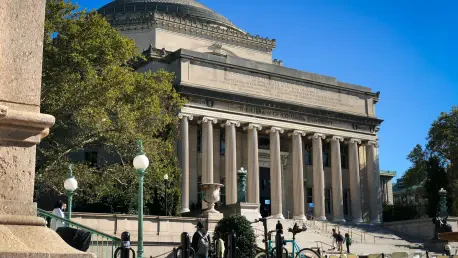An agreement may redefine the boundaries of academic independence, illustrating the far-reaching impact of political influence in education. The Columbia-Trump deal, largely underscored by debates over academic freedom and institutional autonomy, raises critical questions regarding the relationship between federal directives and university administrations.
A Deal With Broad Implications
With Columbia University’s controversial agreement with the Trump administration, fundamental concerns have emerged regarding federal influence over educational institutions. The primary focus of this agreement revolves around the suspension and restoration of federal funding, a critical financial resource for many universities. At the heart of this conflict are allegations of inadequate responses to antisemitism and violations of civil rights. Given the potential for this deal to establish a precedent, it may affect universities nationwide, as the government explores new forms of oversight in academia.
Breaking Down the Agreement
The terms of the Columbia-Trump deal are multifaceted, involving financial settlements, policy mandates, and oversight mechanisms. Columbia University agreed to a $221 million payment to resolve a standoff concerning allegations of civil rights violations. This financial component is complemented by conditions requiring Columbia to adjust its admissions processes, enhance response plans to alleged discrimination, and institute an independent monitor. Such provisions clearly aim to reshape the operational landscape of Columbia and, potentially, similar institutions.
Varied Reactions and Critiques
Opinions on the agreement are divided, reflecting a larger debate on the intersection of politics and academia. Critics, including Columbia law professor David Pozen, perceive the deal as coercive, effectively enabling federal overreach under the label of civil rights enforcement. Conversely, some supporters argue the agreement fosters accountability in addressing antisemitism and could pave the way for improved campus environments. Student organizations and academic bodies have expressed both support and concern, demonstrating the complex nature of this development.
Navigating Academic Challenges
Universities now face the challenge of maintaining their autonomy while complying with federal regulations. The Columbia case provides an exemplar for institutions looking to balance these demands without compromising academic independence. Strategies to safeguard this autonomy could involve creating transparent regulations and ensuring universities control their core policies and educational missions. Learning from Columbia’s experience offers valuable lessons on negotiating federal compliance while preserving the essence of higher education values.
A Moment for Reflection and Action
As educational institutions navigate this evolving landscape, reflective consideration of the Columbia deal’s implications on academic practices and policies becomes crucial. Stakeholders must continue to engage in dialogue on balancing regulatory compliance with protecting institutional independence. The Columbia case highlighted both the possibilities and pitfalls of government-university interactions, underscoring the necessity for vigilance and proactive strategies in preserving the cornerstone of American education: academic freedom.









